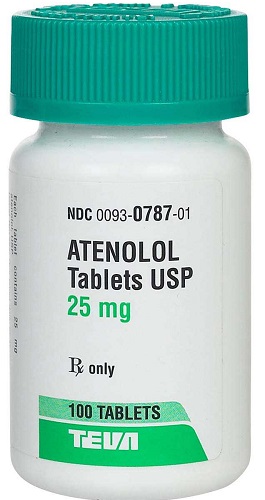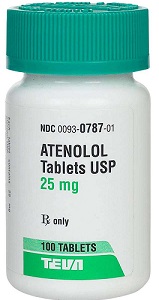Providing Quality & Trust || Clinic Website
Detailed Description
Atenolol
(a-ten-oh-lol)
- Description: Beta-Adrenergic Blocker
- Other Names for this Medication: Tenormin®
- Common Dosage Forms: Veterinary: None.
May be given with or withoutfood. If your animal vomits or acts sick after receiving the drug on an empty stomach, try giving the next dose with food or a small treat. If vomiting continues, contact your veterinarian.
Used in dogs, cats, or ferrets to treat high blood pressure, or certain types of heart problems (eg, fast heartrate).
May cause animal to act “tired” or lack energy.
If this continues or is a problem, contact your veterinarian. If your animal has been on this medication for a while, do not stop it suddenly without your veterinarian’s guidance.
How is this medication useful?
Atenolol is used to treat high blood pressure and other types of heart disease in cats, dogs, and ferrets.
- The FDA has approved this drug for use in humans, but it is not officially approved for use in animals in the USA.
- The FDA allows veterinarians to prescribe products containing this drug in different species or for other conditions in certain situations.
You and your veterinarian can discuss why this drug is the most appropriate choice.
Uses/Indications:
Atenolol may be useful in the treatment of supraventricular tachyarrhythmias, premature ventricular complexes (PVCs, VPCs), and systemic arterial hypertension. It has also been used to reduce clinical signs of thyrotoxicosis in cats. A study evaluating atenolol as monotherapy for treating systemic hypertension in cats with hyperthyroidism found that most cats had a decrease in heart rate, but blood pressure was not controlled (defined as less than 160 mmHg) in 70% of cases, and additional drug therapy (eg, amlodipine or ACE inhibitor) was required.
Although atenolol has been used in cats with subclinical hypertrophic cardiomyopathy, its utility is unproven. Atenolol given to cats with subclinical HCM had decreased heart rate, murmur grade, and LVOT obstruction, and to a lesser degree, frequency of ventricular ectopy. However, it is still unclear if occurrence of sudden cardiac death or long-term outcome is influenced by atenolol administration. A study (prospective, observational, open-label, clinical cohort) found no significant difference in mortality between subclinical cats treated or not treated with atenolol.
Atenolol is often prescribed for semilunar (ie, aortic, pulmonary) valve stenosis; however, a retrospective study of dogs with subvalvular aortic stenosis failed to identify increased survival in those receiving atenolol as compared with those receiving no treatment. In dogs, atenolol has also been used in combination with mexiletine to control arrhythmias associated with arrhythmogenic right ventricular cardiomyopathy (also known as boxer cardiomyopathy).
Atenolol is relatively safe to use in animals with bronchospastic disease (eg, asthma).
Common, but not serious side effects include:
- It is not unusual at the beginning of treatment for animals to have a lack of energy or act tired.
- Vomiting and diarrhea are possible.
You don’t have to be overly concerned if you see any of these signs unless they are severe, worsen, or continue to be a problem.
Contact your veterinarian if this happens.
Side effects that may be serious or indicate a serious problem:
- Very slow heartbeat, shortness of breath, or collapsing (fainting).
- These do not occur commonly and usually means the dose is too high.
Contact your veterinarian immediately if you notice any of these signs.
If you have any other questions about this medication, contact your veterinarian or pharmacist.
Precautions/Warnings:
Atenolol is contraindicated in patients hypersensitive to it and in patients with overt or decompensated heart failure, cardiogenic shock, greater than first-degree heart block, or sinus bradycardia. Atenolol may cause increased morbidity in cats with left-sided CHF caused by hypertrophic cardiomyopathy.
Atenolol should be used cautiously in patients with significant renal insufficiency; dosage reduction is suggested in cats with reduced renal function.
At high dosages, atenolol can mask the clinical signs associated with hypoglycemia. It can also cause hypoglycemia or hyperglycemia and, therefore, should be used cautiously in labile diabetic patients. In humans, atenolol use should be avoided in patients with untreated pheochromocytoma, and this is most likely applicable for veterinary patients as well.
Atenolol can mask the clinical signs (eg, tachycardia, hypertension) associated with thyrotoxicosis.
Genetic variants in the canine adrenoreceptor-1 (ADRB1) gene have been identified in dogs, and dogs with the polymorphism had lower heart rates both at baseline and while receiving atenolol than unaffected dogs.
Exacerbation of signs has been reported following abrupt cessation of β-blockers in humans. It is recommended to withdraw therapy gradually when patients have been receiving this drug chronically.
Powered by nopCommerce
This site is running in live payment mode. Real payments will be processed.

